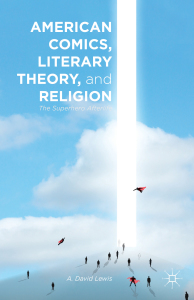Back in December, a reporter for Artuz Sheva talked with David Herman, the man behind the creation of Sabraman, “the first Hebrew-speaking superhero.” (The Jewish Press qualifies that Herman solicited Sabraman from artist Uri Fink; that article appears to be written by Mr. Herman himself, incidentally.) Click in the video link below for that interview, the future of Sabraman, and the musical ventures of Mr. Herman.
Tag Archives: superheroes
“A War of Mythologies”: Jordanian Comic Creator Tackles Extremism
Captain America’s not-so-humble premier was a deliberate propaganda piece for American youth in 1941. With the iconic super-punch to Hitler’s face on the cover of Captain America Comics #1, superheroes became patriots. Nationalism’s partnership with super-heroism still thrives today. With the slate of Marvel films to include Captain America: Civil War in 2016, film audiences can expect to take sides in the battle between Iron Man and Captain America over the limits of patriotism, freedom, and the great responsibility that great powers entail. This would appear to be the inevitable outcome when we imbue superheroes with our conflicting and imperfect moral ideals.
In a November 28th New York Times profile piece, Danny Hakim framed the recent comic creations of Suleiman Bakhit as explicit entries into a similar and ongoing propaganda war against Islamic State recruitment. Bakhit’s TEDtalk on “Superheroes Against Extremism” argued that this is a war over narratives about Islam, identity, hope, and justice. Superheroes must play their part. So where is the ‘Captain America’ for Muslim children that promotes tolerance? “Where,” as he was asked by children in Syria, “is the Arabic Barbie and Superman?” His comics are meant to be answers to these questions. Watch his TEDtalk for yourself:
As he explains, his first attempt, Saladin 2100, met fierce opposition from censors in the Jordanian government who called his comic “too dangerous.” A second attempt, Hero Factor, seems ready to navigate the political waters with more nuance. Following in Captain America’s footsteps, Bakhit hopes his superheroes can be a way to oppose extremism. Persuasive stories will be the key to the development of morals and identities that reject narratives used by extremists to recruit members. Following the work of James Gilligan, a psychiatrist that argued that unhealthy shame is the root of all violence, Bakhit proposes that comics are the “best technology we have to cultivate heroic imagination.” It is this imagination, rooted in our common humanity and search for meaning, that can provide healthy responses to shame that generate love, compassion, tolerance, and true heroism.
Keep your eyes peeled for his comics as they make the (slow) transition into English. In the meanwhile, read more about Bakhit and his efforts here from Wired (UK), Forbes, and this TED blog interview. Or follow him on Twitter @suleimanbakhit.
The Superhero Afterlife Is Here!
 This week sees the debut of S&S Founding Member A. David Lewis’s American Comic Books, Literary Theory, and Religion: The Superhero Afterlife. Based on both his doctoral work from Boston University and his American Academy of Religion (AAR) presentations, Lewis, co-editor of both Graven Images: Religion in Comic Books & Graphic Novels and Digital Death: Mortality and Beyond in the Online Age, delivers his first solo monograph in Comics Studies. Read more here.
This week sees the debut of S&S Founding Member A. David Lewis’s American Comic Books, Literary Theory, and Religion: The Superhero Afterlife. Based on both his doctoral work from Boston University and his American Academy of Religion (AAR) presentations, Lewis, co-editor of both Graven Images: Religion in Comic Books & Graphic Novels and Digital Death: Mortality and Beyond in the Online Age, delivers his first solo monograph in Comics Studies. Read more here.
Spider-Man the Crypto-Jew
Over at Slate, Arie Kaplan considers whether Spider-Man is Jewish, based on input from actor Andrew Garfield, novelist Michael Chabon, and producer Avi Arad. Or, at the very least, is he a “crypto-Jew,” especially considering his brand of humor? Read more here.
(Thanks to Steve Bergson, editor of The Jewish Comix Anthology and proprietor of the Jewish Comics blog for spotting this one. I think he’d appreciate the relevance of the clip below.)
Sequart’s The Last Temptation of Superman
 Over at Sequart, Ian Dawe threads an intriguing connection between Alan Moore and Dave Gibbon’s milestone Superman story “For the Man Who Has Everything” and Nikos Kazantzakis’s The Last Temptation of Christ. Though Superman is frequently posited as a Christ figure, Dawe raises a number of thoughtful points on “Christian overtones” that likely hadn’t previously been applied to this work by the Watchmen team. Read more here.
Over at Sequart, Ian Dawe threads an intriguing connection between Alan Moore and Dave Gibbon’s milestone Superman story “For the Man Who Has Everything” and Nikos Kazantzakis’s The Last Temptation of Christ. Though Superman is frequently posited as a Christ figure, Dawe raises a number of thoughtful points on “Christian overtones” that likely hadn’t previously been applied to this work by the Watchmen team. Read more here.

